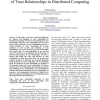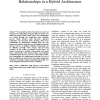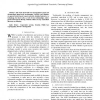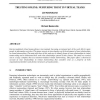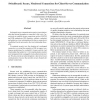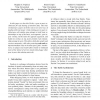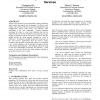140
click to vote
WSDM
2012
ACM
13 years 9 months ago
2012
ACM
Traditionally, research about trust assumes a single type of trust between users. However, trust, as a social concept, inherently has many facets indicating multiple and heterogen...
111
click to vote
JCP
2006
15 years 2 months ago
2006
In this paper, we discuss a general methodology for analysis and modeling of trust relationships in distributed computing. We discuss the classification of trust relationships, cat...
126
click to vote
JCP
2006
15 years 2 months ago
2006
Trust models provide a framework to create and manage trust relationships among the different entities of a Public Key Infrastructure (PKI). These trust relationships are verified ...
122
click to vote
WOA
2007
15 years 3 months ago
2007
—This work deals with trust management in open and decentralized agent-based environments. Analysis and solutions are geared towards peer to peer networks, intended not just as a...
114
click to vote
ECIS
2001
15 years 3 months ago
2001
Internet-mediated virtual teamworking is increasingly becoming an integral part of the work life for many people in information societies. This paper reports an investigation on t...
120
click to vote
NSDI
2008
15 years 4 months ago
2008
Online communication media such as email, instant messaging, bulletin boards, voice-over-IP, and social networking sites allow any sender to reach potentially millions of users at...
129
click to vote
ICDCSW
2002
IEEE
15 years 7 months ago
2002
IEEE
Prolonged secure communication requires trust relationships that extend throughout a connection’s life cycle. Current tools to establish secure connections such as SSL/TLS and S...
121
click to vote
SPW
2004
Springer
15 years 7 months ago
2004
Springer
In this paper we describe Turtle, a peer-to-peer architecture for safe sharing of sensitive data. The truly revolutionary aspect of Turtle rests in its novel way of dealing with t...
104
click to vote
ACMSE
2005
ACM
15 years 7 months ago
2005
ACM
Despite recent advances in trust relationship control mechanisms, issues remain that impede the development of effective trust models. One of these is the lack of dynamic mechanis...
134
click to vote
ACSC
2006
IEEE
15 years 8 months ago
2006
IEEE
Trust networks consist of transitive trust relationships between people, organisations and software agents connected through a medium for communication and interaction. By formali...

